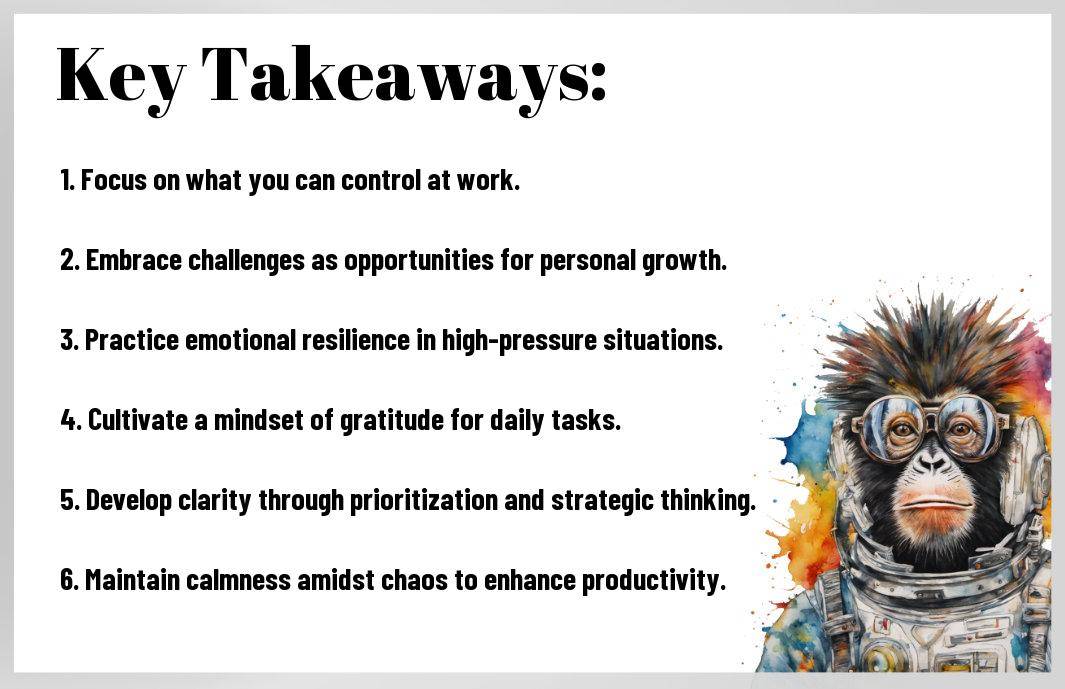It’s amazing how the ancient philosophy of Stoicism can guide us in our modern work lives. As I navigate the complexities of my job, I find that employing Stoic principles helps me manage stress and focus on what truly matters. In this blog post, I’ll share how you can apply Stoicism to enhance your productivity, maintain a positive mindset, and ultimately, succeed at work. Let’s explore these timeless lessons together and see how they can transform your everyday experiences!

Key Takeaways:
- Emotional Resilience: Cultivate emotional strength to handle workplace challenges without being overwhelmed by stress or anxiety.
- Focus on the Present: Concentrate on your current tasks and avoid being distracted by past failures or future worries.
- Acceptance: Learn to accept what is outside of your control, allowing you to redirect your energy towards what you can influence.
- Practical Wisdom: Apply rational decision-making to navigate complex situations effectively, ensuring choices align with your values.
- Self-Discipline: Foster self-control to resist distractions and maintain consistency in your work efforts.
- Perspective Shift: Reframe challenges as opportunities for growth, viewing setbacks as a natural part of the learning process.
- Community and Collaboration: Emphasize working well with others, promoting a harmonious environment that respects different viewpoints.

Embracing Change
Before I explore into the world of Stoicism and its application at work, I want to highlight how important it is to embrace change. In my professional life, I often come across shifts—whether in company culture, team dynamics, or my own responsibilities. These changes, although sometimes daunting, present opportunities for growth and adaptation. By viewing changes as chances to learn rather than obstacles, I find myself more engaged and willing to take on new challenges.
Understanding What You Can Control
Change is an inevitable part of life and work, and one of the most empowering practices I’ve adopted is recognizing what I can and cannot control. In my experience, focusing my energy on the factors within my reach—like my reactions, attitudes, and efforts—has transformed how I approach challenges. By making a conscious effort to allocate my time and resources to what I can influence, I invariably create a more positive and productive work environment. This mindset allows me to remain steadfast amidst uncertainty and brings clarity to my daily tasks.
Letting Go of What You Can’t
Any situation that is beyond my control can often lead to feelings of frustration or anxiety, but I’ve learned that letting go of these concerns is liberating. Accepting that I may not dictate everything that happens in my workplace enables me to let go of the stress attached to it. I no longer dwell on what could have been or what I wish would happen. Instead, I redirect my mental energy toward actionable steps that I can take, which in turn boosts my confidence and resilience.
Control is an illusion when it comes to many aspects of life. Accepting that some things are simply beyond my reach has been a lesson in humility and awareness. In practice, this means that when faced with challenging circumstances—like changes in management or unexpected team shifts—I focus on how I can adapt rather than resist. This acceptance not only reduces my stress but also opens up new pathways for collaboration and innovation, thereby enhancing my overall workplace experience.
Cultivating Resilience
Some days at work can feel overwhelming, and it’s during these times that cultivating resilience becomes important. I’ve learned that resilience isn’t just about bouncing back but also about being present in the face of adversity. By maintaining a Stoic perspective, I try to focus on what I can control while accepting the limitations of what I cannot. This mindset helps me navigate the rough patches with a sense of calm and determination, allowing me to keep moving forward despite challenges. Resilience transforms obstacles into opportunities for personal growth, which eventually leads to greater success in the workplace.
Facing Challenges with a Stoic Mindset
Beside every challenge is an opportunity to apply what I’ve learned from Stoicism. By embracing challenges as part of the journey, I position myself to tackle them head-on rather than retreating in fear or frustration. When a difficult project lands on my desk, I take a moment to assess the situation with an objective lens. Instead of panicking, I remind myself that I can break the project down into manageable parts and prioritize my tasks. This approach allows me to remain focused and steady, turning potential stressors into stepping stones toward my success.
Learning from Failure
Before success often comes failure, and I’ve found that this truth is especially relevant in the workplace. When I encounter setbacks, I make it a point to reflect constructively on what went wrong. By shifting my perspective from seeing failure as a dead end to viewing it as valuable feedback, I can harness those experiences to improve my future performance. Each misstep provides fresh insights that I can integrate into my work, influencing my decisions and actions moving forward.
A lesson in resilience comes from embracing failure and all that it can teach us. I’ve discovered that the most successful individuals often share a common thread: they don’t shy away from mistakes, but rather, they use them as a powerful tool for growth. By analyzing what led to a failure and identifying areas for improvement, I can cultivate a resilient mindset that positions me for ongoing success. It’s all about fostering a willingness to learn and adapt, embracing the notion that each stumble is not simply a setback but a stepping stone on the road to achievement.

Improving Focus and Clarity
Keep in mind that enhancing focus and clarity at work is an integral part of applying Stoicism to succeed. The Stoic principle of staying present allows us to concentrate on the task at hand rather than getting sidetracked by distractions and worries about the future. By fostering a mindset that embraces what I can control, I find that I can commit my full attention to my work, which directly impacts my productivity and overall satisfaction in my role.
The Power of Mindfulness
Behind the scenes of our daily routines, there often lies a whirlwind of thoughts and external influences vying for our attention. Practicing mindfulness helps to cut through the noise and allows me to focus more clearly on the tasks I face each day. By taking a few moments to pause, breathe, and ground myself in the present moment, I set the stage for enhanced clarity. This approach keeps me aligned with Stoic teachings, as it encourages me to remain in the present and respond thoughtfully rather than react impulsively.
Setting Realistic Goals
An effective way to enhance focus and clarity is by setting realistic goals. In my experience, the better I understand my limits and the scope of my responsibilities, the more manageable my tasks become. When I set achievable goals, I find it easier to stay focused and motivated, reducing any overwhelm that might arise from aiming too high without a clear plan. This method reinforces the Stoic belief that we should strive for what is within our control and accept what lies beyond.
The journey towards setting realistic goals is about finding the balance between ambition and practicality. When I break larger objectives into smaller, manageable tasks, I create a roadmap that allows me to measure my progress incrementally. This process not only boosts my confidence as I accomplish each task but also reinforces my commitment to maintaining clarity and focus throughout my workday. In doing this, I can effectively channel my energy into meaningful work and cultivate a more productive mindset.
Effective Communication
Your ability to communicate effectively is key to your success at work, and applying Stoic principles can significantly enhance your interactions. Stoicism encourages us to focus on the present and manage our reactions, which can create a more productive and harmonious work environment. By approaching conversations with a calm mindset, I find that I can convey my thoughts and ideas more clearly, fostering better relationships with colleagues and clients alike.
Listening Without Judgment
After adopting a Stoic approach, I discovered the value of truly listening without jumping to judgment. When I engage in conversations, I strive to put aside my preconceived notions and give my full attention to the speaker. This practice not only acknowledges their viewpoint but also allows me to understand their perspective better. Listening actively without forming opinions too quickly can lead to deeper connections and more constructive discussions.
Expressing Thoughts Calmly
An crucial part of effective communication is the way I express my thoughts. Embracing Stoicism helps me to articulate my ideas in a calm, composed manner, even in challenging situations. This steadiness can defuse tension and promote a more effective exchange of ideas, fostering collaboration and understanding.
For instance, when faced with a disagreement at work, instead of reacting impulsively, I take a moment to pause and gather my thoughts. This allows me to express my viewpoint without getting caught in emotional turmoil. By framing my ideas thoughtfully and calmly, I not only communicate my message more effectively, but I also encourage others to respond in kind, leading to a more constructive dialogue overall.
Building Strong Relationships
Despite the fast-paced nature of the modern workplace, I find that building strong relationships is vital for both personal and professional success. By applying Stoic principles, I can navigate interactions with clarity and purpose, ensuring that my connections with colleagues are meaningful and productive. The focus on self-awareness and understanding the emotions of others allows me to foster a supportive environment where teamwork thrives, and together we can achieve greater goals.
The Importance of Empathy
At the heart of any strong relationship lies empathy. I’ve found that when I put myself in another person’s shoes, I can better understand their perspective and needs. This practice not only enhances communication but also cultivates trust. By genuinely striving to understand how others feel and what they are experiencing, I can create a more inclusive and harmonious workplace where everyone feels valued and heard.
Maintaining Professionalism
At times, workplace dynamics can be challenging. I believe maintaining professionalism is vital, particularly when navigating difficult conversations or conflicts. By staying calm and composed, I can address issues with clarity, which helps to minimize misunderstandings. Professionalism also involves respecting boundaries and understanding the nature of my role within the team, allowing me to contribute effectively without overstepping. Creating a safe space for open dialogue fosters a culture of respect, which ultimately strengthens our collective efforts.
Empathy naturally complements professionalism in the workplace. When I approach my colleagues with understanding, I foster an atmosphere where everyone’s contributions are respected. This balance not only enhances my relationships but also creates a positive work environment where collaboration flourishes. By prioritizing both empathy and professionalism, I can build strong connections that empower us to succeed together.
Work-Life Balance
After adopting Stoic principles in my work life, I’ve come to appreciate the importance of maintaining a healthy work-life balance. It’s easy to get caught up in deadlines and responsibilities, but we can’t neglect our personal well-being. By prioritizing my time and energy, I create space for both my professional ambitions and personal life, ensuring that neither side suffers. This approach helps me feel more fulfilled and productive in both areas, ultimately making me a better employee and a happier individual.
Prioritizing Self-Care
Balance is key when it comes to self-care. I find that taking time for myself—whether through exercise, hobbies, or simply unwinding with a good book—allows me to recharge. By setting boundaries around work hours and committing to this time, I can dedicate myself fully to both my professional and personal tasks. It’s not just about avoiding burnout; it’s about ensuring I bring my best self to everything I do.
Finding Joy Outside Work
Along this journey, I’ve discovered how imperative it is to find joy outside of work. Engaging in activities that I love, such as spending time with loved ones, exploring nature, or pursuing creative projects, enriches my life and alleviates work-related stress. These moments of joy not only improve my mood but also enhance my productivity when I return to work. It’s a wonderful cycle that feeds into itself, making both my work and personal life more enjoyable.
A key aspect of finding joy outside work is being intentional about the time I carve out for these moments. This might mean scheduling family dinners, planning weekend hikes, or dedicating an hour a week to a personal project I’ve been wanting to explore. By actively choosing to prioritize these experiences, I enrich my life beyond the daily grind, leading to a more harmonious existence and reminding myself that work is just one part of the bigger picture.
Final Words
Summing up, I believe that applying Stoicism to our work lives can pave the way for success in a meaningful and fulfilling way. By focusing on what I can control—my responses, actions, and attitudes—I am better equipped to navigate the challenges that come my way. When I embrace this mindset, I find it easier to manage stress, maintain a positive outlook, and foster better relationships with my colleagues. You, too, can find that the principles of Stoicism can greatly enhance your performance and overall job satisfaction.
If you’re interested in diving deeper into how to apply these timeless Stoic principles at work, I recommend checking out this article on how to Be a Stoic to Win in the Workplace. It offers practical insights that can help you bring a sense of calm and clarity to your professional life. Let’s begin on this journey together and harness the power of Stoicism for a more productive and fulfilling work experience!
FAQ
Q: How can Stoicism help me manage stress at work?
A: Stoicism teaches the importance of focusing on what you can control and letting go of what you cannot. By applying this principle, you can reduce stress by acknowledging that some challenges are beyond your influence and focusing your energy on tasks that you can change or improve. Practices such as refocusing your thoughts and practicing mindfulness can also help keep stress at bay.
Q: What Stoic practices can I incorporate into my daily work routine?
A: Some useful Stoic practices include morning reflections to set intentions for the day, daily journaling to assess your thoughts and behaviors, and premeditatio malorum, which is the practice of contemplating potential obstacles and setbacks. This can help you adopt a proactive approach and better prepare for challenges you may face throughout your workday.
Q: How can I apply Stoicism to enhance my decision-making at work?
A: Stoicism encourages logical reasoning and rational thought. To enhance decision-making, you can practice pausing before making choices, evaluating the pros and cons without emotional bias. Reflect on how your decisions align with your values and goals and consider the long-term implications of your actions. This reflective process will help you to make more thoughtful and deliberate decisions.
Q: What role does mindfulness play in a Stoic approach to work?
A: Mindfulness aligns with Stoic practices by fostering awareness of your thoughts and feelings. Being present allows you to observe your reactions without immediate judgment, creating a space for rational response instead of impulsive reaction. Developing mindfulness can improve focus and resilience, making it easier to navigate workplace challenges.
Q: How can I use Stoicism to improve my relationships with colleagues?
A: Implementing Stoic principles can enhance workplace relationships by promoting empathy, understanding, and respect. Practice viewing situations from your colleagues’ perspectives, and exercise patience in discussions. Cultivating a sense of community by recognizing that everyone is working to navigate their challenges can lead to healthier interactions and a more collaborative work environment.
Q: What is the importance of self-discipline in practicing Stoicism at work?
A: Self-discipline is central to Stoic philosophy, as it facilitates adherence to your values and goals. By developing routines, setting boundaries, and avoiding distractions, you can cultivate a work ethic that fosters productivity and personal growth. Stoicism helps maintain focus on long-term objectives instead of yielding to immediate gratification or external pressures.
Q: Can I be successful in a high-pressure job by applying Stoicism?
A: Yes, Stoicism can be especially beneficial in high-pressure environments. The principles of resilience, rationality, and focusing on the present can help you manage the demands and expectations of your role. By using Stoic techniques to regulate emotions and reactions during stressful situations, you can maintain effectiveness and demonstrate composure, ultimately leading to greater success.



